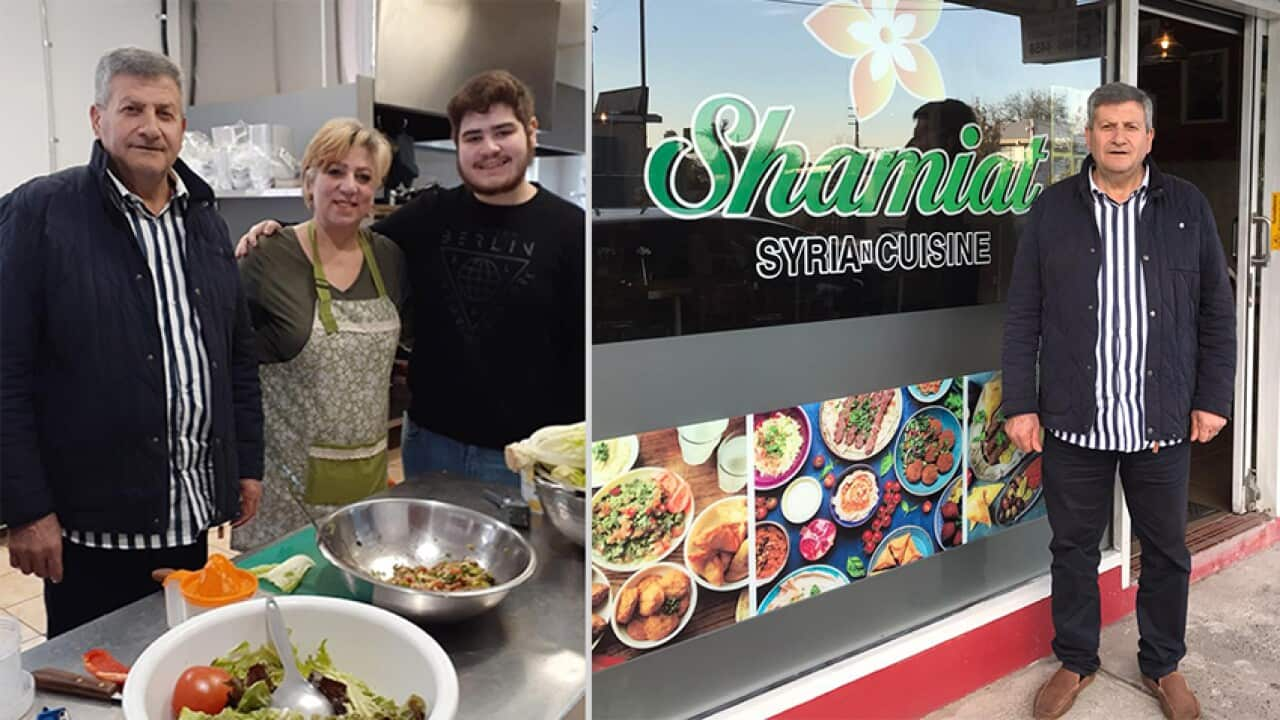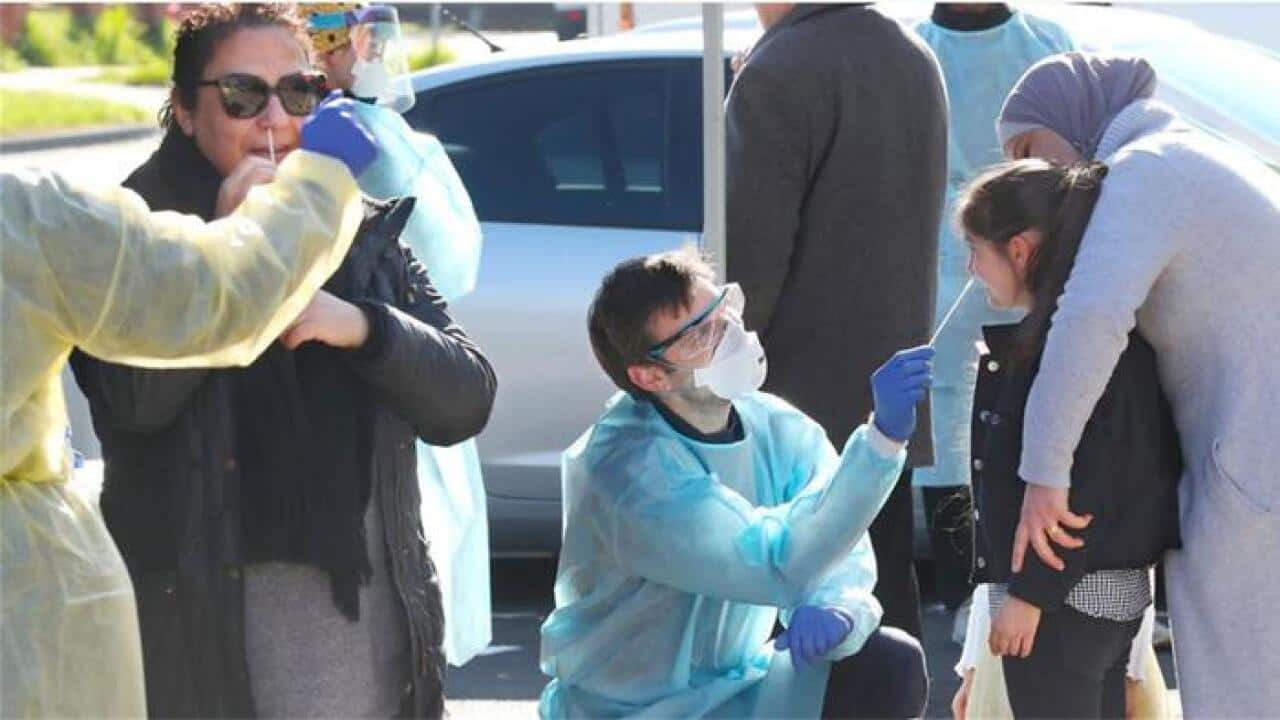Egyptian Asem Gad hasn’t seen his wife and two children since December, and he doubts that they will be reunited any time soon as Australia’s international border remains closed.
The closure was announced by Prime Minister Scott Morrison in early March as a measure to stop the spread of coronavirus and flatten the curve of infections.
The move came 24 hours before enforcement to allow people to “make other arrangements if they were intending to come to Australia,” Mr Morrison said. It meant that only citizens and permanent residents could re-enter after the closure date, with who lodged an application on compassionate grounds.
It meant that only citizens and permanent residents could re-enter after the closure date, with who lodged an application on compassionate grounds.

طائرات تابعة لخطوط كوانتاس متوقفة في مطار سيدني Source: AAP
Mr Gad’s family was scheduled to return from Egypt in the week after the border was closed, and he said he's made several unsuccessful attempts to obtain exemptions to secure their re-entry.
“I applied for an exemption five times on compassionate grounds, I got one response refusing and there wasn’t even a response for the others,” he said, affirming that he’s willing to pay for their quarantine costs.
“We need a solution to be reunited again as a family.”
He believes the government didn’t offer sufficient time for families to return.
“They only gave us 24 hours, it was impossible to pack all your things with two kids in a couple of hours,” he said.
“And anyways, the flight from Egypt takes on average 24 hours or more.” His family visited Egypt while Mr Gad was traveling through regional Australia for his job as a desalination engineer.
His family visited Egypt while Mr Gad was traveling through regional Australia for his job as a desalination engineer.

Asem Gad and his family. Source: عاصم جاد وأسرته في أستراليا قبل أن يعلقوا في مصر
He migrated to Australia with his family after being granted a skilled regional worker visa, which provides a pathway to permanent residency over four years.
“It was the school holidays and I thought instead of them moving with me, they go to Egypt and spend a couple of months with their grandparents,” he said.
“At this point on December 31, there was no sign of closing the borders or banning the non-permanent residents from entry.”
His move to Australia was one that he hoped would be permanent.
“I sold everything in Egypt under the impression that I am migrating. I left my job, sold my assets, and gave away everything hoping that Australia would be my new home."
His family joined him in Australia and they settled in a small town 120km from Queensland's Sunshine Coast.
He now has no idea when he will see them again.
“I feel Australia let me down, it is not a good feeling.
“We walked through this journey to get a migration visa with a pathway to permanent residency, and for what? I may as well have gotten a job offer and come, why did I pay all this money and did all of this and studied, and in the end, I am treated the same as someone who is visiting as a tourist.”
Egyptian, Ahmed Beshr, 31, is in a similar position.
He arrived in Australia with a skilled regional worker visa in November, settling in Newcastle.
As a physiotherapist, he works in the aged care sector and hoped to bring his family over when he got settled.
“I arrived alone to sort out the house and everything, and then I lodged my family’s visa application and in two days everything was shut down before they are even granted the visa,” he said.
“I have two kids, one is four years old, and the other was born just one month before my arrival, he is now eight months.
“My four-year-old is refusing to talk to me anymore, he is thinking I chose to be away.
“The doctor said he is getting depressed, and I included this in the last time I applied for an exemption, but I still got rejected.” Mr Beshr said he has received "automatic replies" when being notified of his exemption rejected.
Mr Beshr said he has received "automatic replies" when being notified of his exemption rejected.

Ahmed Beshr's children. Source: Supplied
“It is unfair, there are no clear criteria for these exemptions.
“I offered to pay for quarantine and everything in one of my exemption applications, but also got a rejection.”
Fellow temporary visa holder Mohamed Saed is another person struggling with the process.
“I applied four times to bring my wife and daughter back [to Australia], I didn’t imagine I would be away from them this long, and don’t know for how long, there is no clarity.”
Mr Saed has lived in Brisbane since 2017 where he works for health provider Medibank.
After his wife gave birth to their child, she travelled back to Egypt while he completed exams.
“They left in November 2019, my daughter with three and a half months, and I was supposed to join them after finishing my exams in February.”
He booked his ticket for March but then the borders were closed.
“My daughter is almost a year now, I didn’t see her since November, I didn’t see my mother for two years, and I feel helpless, I can’t do anything.
“If I decided to go to Egypt, this thing might go on for a year or two, my whole life is in Australia, my house, my job, my car.
“Every time we apply on compassionate grounds, and I tell them my situation, we get the same response - you don’t meet the criteria.
“I don’t get benefits from the state, I work, and I pay my taxes and my own medical insurance, and at the end, this is how I am treated.
“I call on the government to look different from our situation, especially people who have settled in Australia already and are on the pathway for permanent residency."
People in Australia must stay at least 1.5 metres away from others. Check your state’s restrictions on gathering limits.
If you are experiencing cold or flu symptoms, stay home and arrange a test by calling your doctor or contact the Coronavirus Health Information Hotline on 1800 020 080.







